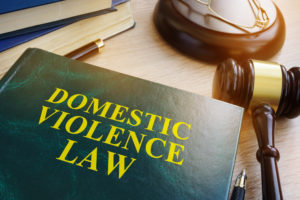Protected Persons in NJ Domestic Violence Cases

How do I Protect Myself and Others from Domestic Violence in New Jersey?
Restraining orders are available to victims of domestic violence in New Jersey. A restraining order is a court order that prohibits one person from contacting another person. Before a final restraining order can be granted, the alleged victim/plaintiff must apply for a temporary restraining order. The matter is brought before a judge who either grants or denies the request. If granted, a written temporary order is given that clearly outlines the name of the applicant, the name of the Defendant/alleged abuser, and nature and location of prohibited contact.
The temporary restraining order becomes immediately effective and must be served on the defendant. The temporary order lists a court date for a final hearing, among other details of the specific case. At the final hearing, the judge will hear testimony from both sides, review evidence, and make a finding as to whether any acts of domestic violence occurred and if Plaintiff is in fear for their safety, thus requiring an order of protection.
The restraining order will specifically outline what contact, if any, is permissible and who exactly is to be protected. In effectuating a final restraining order, the court will take into consideration the victim’s request to include other people in the order. If anyone else is included in the permanent restraining order, he or she becomes a “protected person.” In addition to the plaintiff, the Defendant is restrained from contacting any protected person in the FRO.
Who can be a Protected Person under a Restraining Order?
A protected person is anyone that the restraining order names as a person that the Defendant cannot have contact with. This includes the victim, as well as anyone with whom he or she lives and any individuals whose safety may be in jeopardy if not protected under the order. Frequently, spouses or those in romantic relationships are persons that file for protection under the domestic violence act. The parties often have children in common and the victim/plaintiff may request that the court list the child as a protected party under the order. In these cases, the plaintiff must demonstrate to the court that the children are in danger of abuse if not protected under the order.
For example, perhaps John and Ava are married and share two children together. John is an alcoholic with mental health issues who decides to set the house on fire after consuming copious amounts of alcohol. Ava seeks a restraining order naming the former couple’s two children as protected persons. If the court grants Ava’s request to include the children in the final order, John must never have contact with Ava or the children unless and until the order is amended or dissolved. Should John have any contact with any protected person, he will be exposed to legal consequences.
Restraining Order Violations involving Protected Parties in NJ
Any type of contact with a protected person would be prohibited under the restraining order once issued. In the example above, if John contacts Ava or the children in any way, he could be charged with a violation of the restraining order known as contempt. Common examples of prohibited contact are telephone calls, text messages, Facebook messages, direct messages or postings using social media, emails, or other forms of written or indirect contact.
Even if the children have turned 18 and ten years have passed since the issuance of the restraining order, John cannot contact the children if the order is still in place. People often get into trouble by thinking that enough time has passed and a simple message may be considered OK. Nevertheless, this or any other form of contact is not permitted in the eyes of the court and the person subject to the restraining order can face contempt charges.
Contempt of court can either be a misdemeanor or felony offense. Even some misdemeanor contempt cases (2 or more) will subject you to a mandatory jail term of 30 days and the ultimate exposure is 180 days. In the case of a felony forth degree contempt, you could be sentence to jail for 18 months.
Have Questions about an Order of Protection in NJ, Who Can Help?
If you are involved in a case of domestic violence, are seeking to include protected persons in a final restraining order, or want to fight a restraining order that has been filed against you, contact our team for immediate help today. We are here to answer all of your questions and will skillfully represent you during a final restraining order hearing, contempt case, or dissolution of a restraining order proceedings. Our attorneys have successfully resolved thousands of restraining orders and associated domestic violence matters in courts throughout New Jersey, so let us serve as a resource for you. Contact our offices at (908)-336-5008 now for a free consultation.



